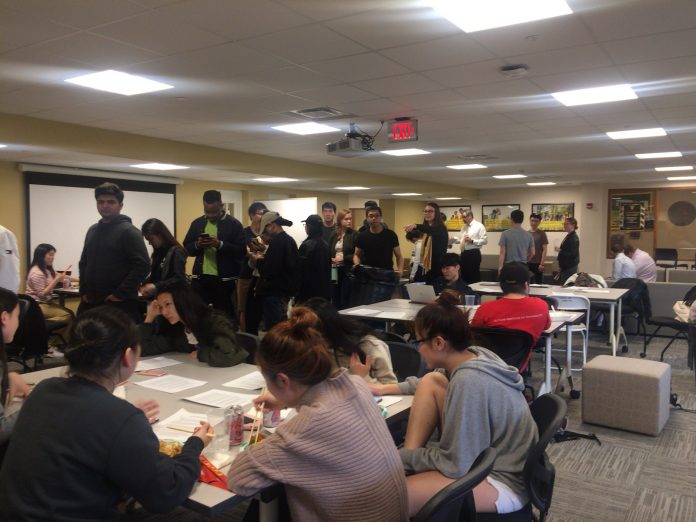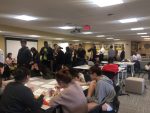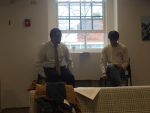
President Mark McCoy and several related administrators reacted to international students’ concerns by holding a dinner discussion on Friday evening at the Union Building.
Some students, primarily international liaisons working under the admission office, sent a two-page list of questions to President McCoy in advance. Sophomore Yutaka Phyo, also a liaison, presided the Q&A. Chinese dinner was served to all attendees while administrators didn’t eat it.
The international community at DePauw is not disconnected from the series of recent bias incidents. On April 18, the racial slur found in Lucy Hall specifically targeted the biggest international group: Chinese students.
Senior Yu Lei first inquired about the treatment of perpetrators of the bias incidents. President McCoy answered, “We’ve got a lot of clues that have been very helpful” with the Federal Bureau of Investigation (FBI) officers, sketch artists and the reward for public reports, even some spots lack in surveillance cameras. Although saying “I don’t believe we will solve all of them,” he explained the offenders would be put through either DePauw’s judicial process or the legal prosecution.
President McCoy said one of the reasons why DePauw called the FBI was as a deterrent for further occurrences. Later, responding to sophomore Sakshi Sharma’s question, President McCoy said he has not received any reports from the FBI investigation yet. “What we’re allowed report, we’re going to continue to report,” he stated.
For a specific question on the consequence of a student’s offensive behavior at the Duck, President McCoy said, “I can’t speak about individual cases.” He then marked the distinction between an illegal hate speech, such as threats written in restrooms, and an inadvertent hate speech. “We have a judicial process on this campus to deal with infractions that … [is not] raised to the level of a crime” with Indiana's legal system.
Sophomore Rabia Daud questioned the reason the administrators have not addressed the Lucy incident targeting Chinese students as well as an incident at Walmart where Muslim students had a local resident point a gun at them several months ago. “It makes us wonder if we are not as important … as if we don’t go out and protest,” Daud said.
President McCoy attributed the absence of detailed announcements to the delay of the reports to the Public Safety, typically made after the facts went viral on social media. “Please report to us any incident that you have” using university resources, he requested.
While talking about the hectic duty of tackling every issue as he “can’t even remember the order of these incidents,” President McCoy apologized for not responding to the last case as strong as the first one. He concluded “[it’s not the case that] students of any nationality are less important than of any other nationality… Every single person on this campus matters to me personally, very deeply.”
Questions covered the “Anti-Bias Training” mentioned in the Community Actions Message email sent on Thursday from Vice President of Academic Affairs Anne Harris and Vice President of Student Academic Life Alan Hill. President McCoy revealed his personal suggestion to the administration of conducting a “courtroom play” where students experience the role of the jury to recognize biases on campus. Dean of Students Myrna Hernandez added that they have already consulted with several national organizations providing anti-bias education.
The existing Day of Dialogue and the protest policy were also discussed. Vice President for Enrollment Management Bobby Andrews spoke on the resignation of tour guides.
After the meeting, President McCoy went to another session with the Jewish student community held at Hartman House.
Looking back, Daud said, “I think President McCoy’s responses were honest,” mentioning his acknowledgment of issues with the international community. Daud also suggested the Day of Dialogue is not the panacea. “A single day cannot fix all the serious problems in our community. And we need to look for more creative and engaging ideas to make our campus more welcoming and inclusive.”



